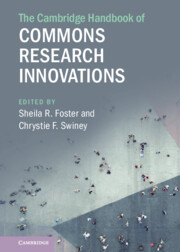Book contents
- The Cambridge Handbook of Commons Research Innovations
- The Cambridge Handbook of Commons Research Innovations
- Copyright page
- Contents
- Figures
- Tables
- Contributors
- Introduction
- Part I Revisiting the Origins and Evolution of Commons Thought
- 1 Linking the Origins and Extensions of Commons Theory
- 2 The Tragedy of Garrett Hardin’s Commons
- 3 Kinship and Commons: The Bedouin Experience
- Part II Averting New Tragedies
- Part III New Forms of Contested Commons
- Part IV Urban Landscape and Infrastructure as a Commons
- Part V Reassessing Old and New Institutions for Collective Action
- Part VI Managing and Restoring the Commons
- Part VII Law, Legal Theory, and the Commons
- Part VIII Technology, the Internet, and the Future of Commons Governance
- Index
1 - Linking the Origins and Extensions of Commons Theory
from Part I - Revisiting the Origins and Evolution of Commons Thought
Published online by Cambridge University Press: 29 October 2021
- The Cambridge Handbook of Commons Research Innovations
- The Cambridge Handbook of Commons Research Innovations
- Copyright page
- Contents
- Figures
- Tables
- Contributors
- Introduction
- Part I Revisiting the Origins and Evolution of Commons Thought
- 1 Linking the Origins and Extensions of Commons Theory
- 2 The Tragedy of Garrett Hardin’s Commons
- 3 Kinship and Commons: The Bedouin Experience
- Part II Averting New Tragedies
- Part III New Forms of Contested Commons
- Part IV Urban Landscape and Infrastructure as a Commons
- Part V Reassessing Old and New Institutions for Collective Action
- Part VI Managing and Restoring the Commons
- Part VII Law, Legal Theory, and the Commons
- Part VIII Technology, the Internet, and the Future of Commons Governance
- Index
Summary
Innovations in commons research and extensions of the commons framework have moved far beyond the archetypal village grazing pasture.The dynamism of the field may therefore prompt some reflection on what “commons theory” or “the commons framework” means in non-territorially bounded commons.Fortunately, the origins of Elinor Ostrom’s framework are compatible with such innovations and extensions; indeed, reexamining the line of inquiry that gave rise to the Ostrom framework may benefit those working now on the field’s research frontiers.A political scientist, Ostrom was principally concerned throughout her career – and acutely in the period leading to Governing the Commons – with how people manage (and sometimes fail) to organize the governance of anything by creating and modifying institutional arrangements for coordinating their behavior and pursuing shared goals.In this chapter, those original questions that animated Ostrom’s work are reconsidered for the insights they can provide for current innovations in commons research.
- Type
- Chapter
- Information
- The Cambridge Handbook of Commons Research Innovations , pp. 17 - 25Publisher: Cambridge University PressPrint publication year: 2021

